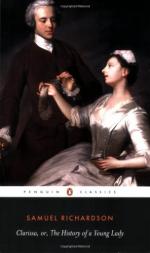A messenger is just now arrived from my uncle. The mortification, it seems, is got to his knee; and the surgeons declare that he cannot live many days. He therefore sends for me directly, with these shocking words, that I will come and close his eyes. My servant or his must of necessity be in town every day on his case, or other affairs; and one of them shall regularly attend you for any letter or commands. It will be charity to write to me as often as you can. For although I am likely to be a considerable gainer by the poor man’s death, yet I cannot say that I at all love these scenes of death and the doctor so near me. The doctor and death I should have said; for that is the natural order, and generally speaking, the one is but the harbinger to the other.
If, therefore, you decline to oblige me, I shall think you are displeased with my freedom. But let me tell you, at the same, that no man has a right to be displeased at freedoms taken with him for faults he is not ashamed to be guilty of.
J. Belford.
LETTER XIX
MISS CLARISSA HARLOWE, TO MISS HOWE
I thank you and Mr. Hickman for his letter, sent me with such kind expedition; and proceed to obey my dear menacing tyranness.
[She then gives the particulars of what passed between
herself and Mr.
Lovelace on Tuesday morning, in
relation to his four friends, and to
Miss Partington, pretty much to
the same effect as in Mr. Lovelace’s
Letter, No. XIII. And
then proceeds:]
He is constantly accusing me of over-scrupulousness. He says, ’I am always out of humour with him: that I could not have behaved more reservedly to Mr. Solmes: and that it is contrary to all his hopes and notions, that he should not, in so long a time, find himself able to inspire the person, whom he hoped so soon to have the honour to call his, with the least distinguishing tenderness for him before-hand.’
Silly and partial encroacher! not to know to what to attribute the reserve I am forced to treat him with! But his pride has eaten up his prudence. It is indeed a dirty low pride, that has swallowed up the true pride which should have set him above the vanity that has overrun him.
Yet he pretends that he has no pride but in obliging me: and is always talking of his reverence and humility, and such sort of stuff: but of this I am sure that he has, as I observed the first time I saw him,* too much regard to his own person, greatly to value that of his wife, marry he whom he will: and I must be blind, if I did not see that he is exceedingly vain of his external advantages, and of that address, which, if it has any merit in it to an outward eye, is perhaps owing more to his confidence that [sic] to any thing else.
* See Vol. I. Letter III.
Have you not beheld the man, when I was your happy guest, as he walked to his chariot, looking about him, as if to observe what eyes his specious person and air had attracted?




